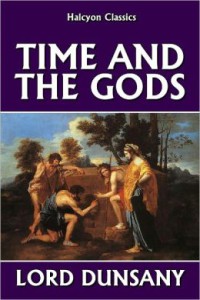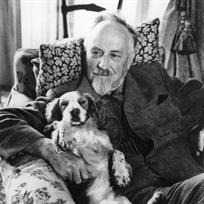Lord Dunsany Re-Read: Time and the Gods Part 3
 Bill Ward and I are continuing our Lord Dunsany re-read with the next two stories published in the original Time and the Gods (not the omnibus). You can find a free copy of the book here and join in the discussion. Our rating system is pretty simple. One star is a standout, and two stars is truly notable. Most of Lord Dunsany’s fantasy work is already fairly remarkable, so even a “no star” story on this scale may be worth a look.
Bill Ward and I are continuing our Lord Dunsany re-read with the next two stories published in the original Time and the Gods (not the omnibus). You can find a free copy of the book here and join in the discussion. Our rating system is pretty simple. One star is a standout, and two stars is truly notable. Most of Lord Dunsany’s fantasy work is already fairly remarkable, so even a “no star” story on this scale may be worth a look.
Howard: I like each of this week’s stories at least one star worth. Both dealt with the nature of gods and their worshippers. I can’t help thinking that Lord Dunsany himself was secretly an agnostic or atheist, for he has much fun with the pomp of religion, and the foolish things men worship. One of the most amusing points in “When the Gods Slept” comes when the Yozis try to convince a culture to worship them, only to be turned away because of that culture’s great faith in a mountain. The Gods of Pegana are capricious and wrathful and bored, and, as it happens, asleep.
 But then perhaps Lord Dunsany uses his stories of gods to speak to us of men. In “The King Who was Not,” he showed us a ruler so arrogant that he had images of the gods cast in his own image. And in “When the Gods Slept” we saw all manner of worshippers — some who were foolish and merely continued their practices out of habit, others who seemed more honorably to persist in what they were doing. And we were given three evil gods who finally found worshippers in baboons who they transformed into men, and they ever after worshiped madness, spite, and malice. I particularly liked this line: “And men could not discern what they were, for their bodies were bodies of men, though their souls were still the souls of beasts and their worship went to the Yozis, spirits of ill.” In the end, then, although this particular fable gives us many views of religion, it becomes a myth about how evil came to mankind, and how it happened while the gods weren’t paying attention, because they had grown bored.
But then perhaps Lord Dunsany uses his stories of gods to speak to us of men. In “The King Who was Not,” he showed us a ruler so arrogant that he had images of the gods cast in his own image. And in “When the Gods Slept” we saw all manner of worshippers — some who were foolish and merely continued their practices out of habit, others who seemed more honorably to persist in what they were doing. And we were given three evil gods who finally found worshippers in baboons who they transformed into men, and they ever after worshiped madness, spite, and malice. I particularly liked this line: “And men could not discern what they were, for their bodies were bodies of men, though their souls were still the souls of beasts and their worship went to the Yozis, spirits of ill.” In the end, then, although this particular fable gives us many views of religion, it becomes a myth about how evil came to mankind, and how it happened while the gods weren’t paying attention, because they had grown bored.
Bill: I agree that both stories deserve a star, and I share your surmise about Dunsany’s irreligion, as he does have an outsider’s perspective on the whole thing, moreso I think than, say, a devoutly Christian writer of fantastical faiths would have. And, though he writes a great deal about gods and worship, it is always more as an anthropologist or mythologist, he never seems to examine, for example, an individual’s personal faith or its integration into a society. Of course, that is par for the course with the nature of the stories he is trying to tell, and one could maybe argue that the Old Testament handles religion on this same superficial or external level of punishment and reward.
 I really like that “When the Gods Slept” presents the birth of evil in the world as being the result of the gods’ own indifference and boredom. Their words of power are read by the Yozis, who then encounter many cultures that already have a religion (including those that worship the future, and the past, a nice modern insight that goes beyond merely praying to god X), finally settling on elevating beasts to the position of men in order that evil may be worshipped (and who would deny that those that do great evil in effect lower themselves to the position of beasts?). The last line, the gods awaking with a start, is wonderful — they have gotten the novel thing they longed for, but it is not at all what they intended or desired.
I really like that “When the Gods Slept” presents the birth of evil in the world as being the result of the gods’ own indifference and boredom. Their words of power are read by the Yozis, who then encounter many cultures that already have a religion (including those that worship the future, and the past, a nice modern insight that goes beyond merely praying to god X), finally settling on elevating beasts to the position of men in order that evil may be worshipped (and who would deny that those that do great evil in effect lower themselves to the position of beasts?). The last line, the gods awaking with a start, is wonderful — they have gotten the novel thing they longed for, but it is not at all what they intended or desired.
“The King That Was Not” is short and sweet, a great compact little tale that sits itself nicely within this whole unfolding mythscape. Here the gods are every bit as petty and arrogant as the man who would make them in his own image (though, of course, the King did not order the sculptors to put his face on the gods, they merely did it to please him), however there’s is the power to erase him utterly from existence, past or present. And in a very direct way this story does tell a fundamental truth about religion (at least from my and, presumably, Dunsany’s non-religious perspective) that we make it in our own image, and are best pleased when it reflects what we most want to believe about ourselves.
Howard: We’ll continue our re-read next Friday with “The Cave of Kai” and “The Sorrow of Search.” Hope to see you here!
0 Comments